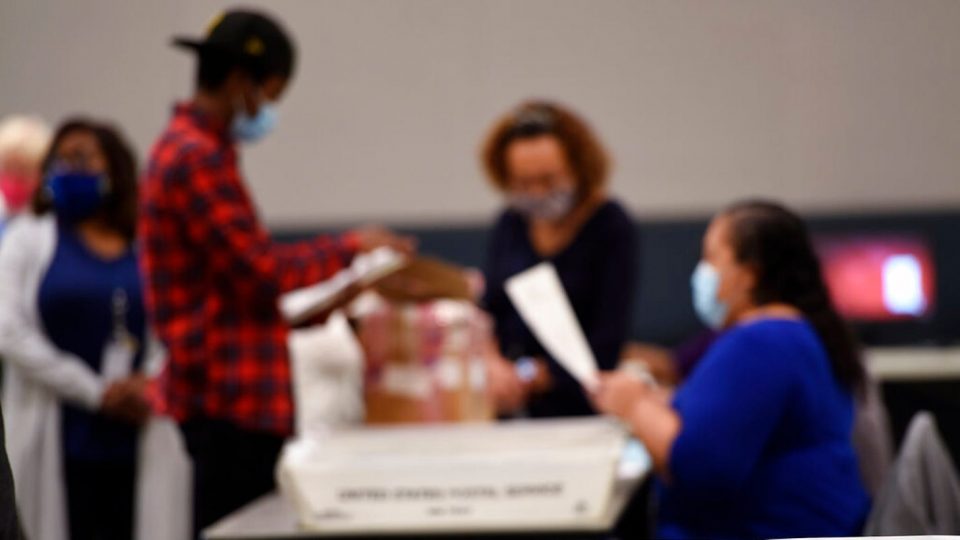Fiercely contested elections can signal a healthy democracy. The free flow of divergent ideas are the bread and butter of democratic processes. Attempts to discredit election outcomes because a candidate doesn’t like them are different.
Such delegitimization regularly occurs elsewhere, but few expected such authoritarian tendencies would haunt the recent American election.
Before Nov. 3, paramilitary threats of violence and hostile interference sounded the first alarm for a democracy at risk. FBI officials exposed an alleged Michigan militia plot to kidnap the state’s governor and hold other legislators hostage. The conspiracy also attempted to target law enforcement officers at their home addresses.
After the election threats did not disappear. Refusal to acknowledge election results have led to death threats against officials. Continuous denials and falsehoods sow mistrust among voters and hollow out prized democratic structures. Threats of violence remain a recurring theme throughout 2020.
Despite the end of the election and the beginning of a peaceful transfer of power, democracy is more vulnerable than ever. Whosoever was “forced to witness the extinction of freedom,” Holocaust survivor Jean Amery once wrote about Germany in 1933, “knows that one must be vigilant.”
Americans, too, must remain vigilant to anti-democratic developments at home and abroad. Some countries in the European Union, like Poland and Hungary, already have chipped away at democracy. Their turn to illiberal politics has paralyzed European Union institutions. The Hungarian Conservative Christian Democratic government effectively sent Budapest’s Central European University into exile after Viktor Orbán’s administration used anti-Semitic tropes to demonize the university’s founder, Holocaust survivor George Soros.
The European Court of Justice condemnation of the university’s expulsion came three years too late. Populist movements collaborate across borders, corroding social structures in education, the arts and politics. Ignoring these mounting restrictions on rights and freedom of expression among European allies puts in peril democratic institutions in America.
The past shows how delegitimizing elections and promoting civil unrest led to danger. Before the Holocaust, the Nazi Party used paramilitary threats in 1930s Germany. By instigating street violence amid elections, Nazis gained political advantage. When other groups organized their paramilitaries, they only played into the hands of Nazi ambitions to discredit Weimar democracy.
Brownshirts supposedly defended the German nation against internal enemies. But street violence only diverted public attention away from powerful alliances forming behind closed doors. Those alliances issued emergency degrees and eliminated democratically elected governments. By 1933, such measures ultimately swept Adolf Hitler into power.
The violent hollowing out of democracy did not end there. A day after the German parliament building burned down in 1933, the right of assembly, freedom of speech and freedom of the press were suspended. Arrests and charges of political opponents followed. “The Decree for the Protection of the German People” banned all parties except the Nazi party.
By 1938, the state-sponsored pogrom, the Night of Broken Glass, targeted Jews throughout Germany unobstructed. A violence-plagued election brought Hitler into power and led, step by step, to mass incarceration, dispossession of property, forced relocations and eventual mass murder.
While we must heed these warnings, creating and protecting democracies based on justice and accountability can achieve success. The transition from the South African apartheid regime to a democracy is one example. Protest and democratic alliances reversed recent authoritarian trends in that country. Every day, South Africans showed extraordinary resilience, joining with media outlets, the justice system and an active civil society to overcome Jacob Zuma’s corrupt presidency.
American citizens today must also refuse a path to authoritarianism and political unaccountability, one that Germany took in 1933 with devastating results. Threats left unattended undermine democracy. Disinformation and violence cumulatively chip away at voter trust, until voters themselves shrug as once viable and vibrant democracies crumble into lawlessness. In the U.S., we must speak up and demand pledges from elected officials and law enforcement to unequivocally respect election results and disavow post-election violence. A healthy democracy rises upon the free flow of ideas and democratic expressions of the people’s will. It falls with conspiratorial ideologies so enfeebled that only violence can help them prevail.
Tali Nates is director of the Johannesburg Holocaust and Genocide Center. Björn Krondorfer is director of the Martin-Springer Institute. Steven Carr is director of the Institute for Holocaust and Genocide Studies. Andrea Peto is a professor at Central European University in Vienna.
Read or Share this story: https://www.detroitnews.com/story/opinion/2020/12/01/opinion-discrediting-election-outcomes-creates-risk-democracy/6464337002/


